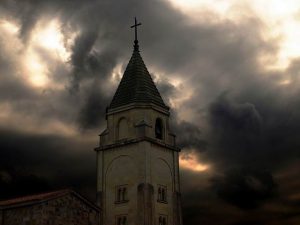RCL Reflection for the Fifth Sunday in Lent, Year A
Lessons: Ezekiel 37:1-14, Psalm 130, Romans 8:6-11, John 11:1-45
Theme: God’s faithful and generous people know that the Creator of the Cosmos is in the business of resurrection—from dry bones to stinky sinners, nothing is beyond God’s reach, love, and mercy.
Key Scripture: But if Christ is in you, though the body is dead because of sin, the Spirit is life because of righteousness. If the Spirit of him who raised Jesus from the dead dwells in you, he who raised Christ from the dead will give life to your mortal bodies also through his Spirit that dwells in you. Romans 8:10-11
Preaching/Teaching Reflection
The spate of long gospel readings continues this week with the story of Jesus raising Lazarus, his friend, from the dead – not just from sleep but from stinky-in-the-tomb dead. The story is jam-packed with excellent material around which to construct a sermon or lesson; one should never lack for plenteous options.
 But that’s not all! We also have the “dry bones” text from Ezekiel and Paul’s passage from Romans that culminates with “If the Spirit of him who raised Jesus from the dead dwells in you, he who raised Christ from the dead will give life to your mortal bodies also through his Spirit that dwells in you” (8:11). What a wonderful feast of words and images!
But that’s not all! We also have the “dry bones” text from Ezekiel and Paul’s passage from Romans that culminates with “If the Spirit of him who raised Jesus from the dead dwells in you, he who raised Christ from the dead will give life to your mortal bodies also through his Spirit that dwells in you” (8:11). What a wonderful feast of words and images!
The promise of resurrection abounds in these readings. We have the literal restoration from death to life of Lazarus, the restoration of a people to hope and place, and new life in Christ through the indwelling of the Holy Spirit. That’s a lot of life and hope packed into 65 verses of scripture, a whole lot of good news for a hurting world.
You know, we Christians talk a lot about being “resurrection people,” but do we really live like it? How often do we let the cares of the world distract us or allow fear to bind us? Why are we so timid about sharing the gospel and telling our faith stories? What an amazing thing we have to share! God loves us to new life–not death. There is plenty of witness to that fact in the readings this week.
Just as God had the prophet Ezekiel breathe a breath of hope into Israel, so too are we as leaders called to breathe hope into the communities where we serve. Perhaps a useful approach this week is to figure out just where hope is lacking in one’s context. Are individuals disheartened by headlines or life events? Is the congregation’s lifeblood oozing forth in pools of despair over flagging numbers and shrinking coffers? Are you as a leader weary and discouraged?
If you answered yes to one or more of those questions, then let these stories be the lens through which the people with whom you share life and ministry catch a glimpse of personal and corporate resurrection. If God can animate dry bones, if Jesus can bring about the restoration of rotting flesh, imagine what the Spirit can do for a tired congregation, for a group of weary and battered disciples, and for the communities in which our congregations are rooted!

It’s not that far-fetched you know. Just take a look at modern medicine. Cadaver bones are increasingly being used to help mend broken bones and torn ligaments. Bio-absorbable screws manufactured from cadaver tissue, known as an allograft, are helping patients experience “new life” in the form of increased mobility, quicker recovery, and less risk of infection.
If “dry bones” can make this kind of difference in medicine, imagine what renewal the Spirit can make of our dry bones and dried up dreams. Where God is, there is always hope. Our job is to tell the stories boldly and to really, honestly believe the words we speak.
Pray for the wisdom, the courage, the belief and the audacious hope to share this good news. Make sure you feel the hope and the boldness of God’s promises deep in your bones. Wouldn’t it be wonderful to walk toward Easter truly believing in the Resurrection–not only of our Lord but also of his body, the church?
In Worship
What “dry bones” are keeping your faith community from experiencing the full breadth and depth of Spirit-filled living? Maybe the skeletal remains in your congregational closet include a femur of fear or a tibula of timidity. Maybe there’s a knuckle or two of nonsense and a clavicle of excessive care. Surely there aren’t any elbows of excuses? Can these bones live? Of course they can … through the breath of the Spirit wind that’s already present among you. What will it take to name these bones and let words of prophetic hope knit them together and reanimate the Body of Christ in your context? Consider giving each person a paper “bone” cut out on which to name the “dry bone” that they perceive to be “deadening” the ministry and mission of the congregation. Collect the “bones” in a basket for further discussion and reflection. Pray over these “bones” for the Spirit-breathe of God to reanimate and enliven God’s people in your place.
With Youth
Most of your high school youth will be familiar with at least one or two works of William Shakespeare. Have you ever noticed that the fourth evangelist’s retelling of the Lazarus story has all of the dramatic elements of a good Shakespeare play? Consider having your youth explore this story and prepare a dramatic retelling of it “Shakespeare” style. You have your “chorus” of professional mourners, Thomas’ pithy observations, the continual misunderstanding of Jesus’ words, and some wonderful rising conflict. Make a special point of examining what it means for Jesus’ to call Lazarus out and then command the crowd to “Unbind him, and let him go.” What does it mean for us to be unbound by Jesus? How can we share this freedom with others–whether in a silly retelling of an amazing story or in deep conversation with a hurting friend?
With Children
Waiting on the Lord
Ask the children if they’ve ever had to wait for something really, really good, and if so, what was it and what was it like to wait? Some may mention birthdays, holidays, vacations, presents, a toy, or a special event. If you have a story about waiting be sure to share it with them. Now ask them what it means to wait on the Lord like the Psalmist sings in Psalm 130? How might waiting on the Lord be different? Try to get them to see that waiting on the Lord means being attentive to and present for God. Waiting on the Lord means trusting. It means worshiping. It means praying. It means studying scripture. It means trusting that God will care for us. It means knowing and having faith that God loves us and will always be there for us. It’s not like waiting for an ice cream cone or for Santa to come. Waiting on God is part of our everyday life.
Invite the children to set an extra place for God at the table during the week as a way of acknowledging that God is always with us. Finish with a simple prayer.
Weekly Stewardship Bulletin Insert
As faithful stewards of God’s abundance, we are called to resurrection both in this present life and in the life after death. God wants to take our dry bones, stinking sin, and dried up dreams and renew us for faithful service and stewardship. Where there is God, there is always hope. Let us pray for hope, courage, and renewal.
Stewardship at Home
Grief and death are very real parts of life. Mary and Martha were grieving the death of their brother when Jesus arrives — too late by human standards. Yet Both Martha and Mary cling to a spark of stubborn hope in their Lord, and their glimmer of hope becomes a resounding roar of resurrection when Jesus calls Lazarus from the tomb. Jesus is in the business of unbinding us and setting us free to be his people. What are you grieving? Where has there been loss and death in your life? From what do you need to be unbound and called out into newness of life? Ponder these questions this week. Pray for Jesus to unbind your heart and anything that drives a wedge between you and your Lord. Send notes of encouragement and sympathy to those who are grieving or discouraged. Where there is God, there is always hope.
Photos: Tim, Will, and Ignorant Walking, Creative Commons. Thanks!
Note: Reprint rights granted to congregations and other church organizations for local, nonprofit use. Just include this note: “Copyright (c) 2017, Rev. Sharron Blezard. Used by Permission.” Other uses, please inquire: thewritelife@hotmail.com.




Leave a Reply